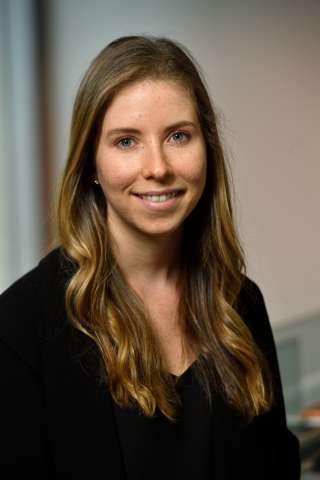
Delving into the Complexities of the Food System: A Q&A with Bloomberg Fellow Caroline Rains
December 9, 2020
Caroline Rains always had an interest in food, from reading a book of A to Z food additives (for fun!) to advocating against factory farming. Her preference for social sciences over hard sciences had initially discouraged her from a career in public health, but, she says, “a couple of experiences during college helped me realize that public health wasn’t purely hard sciences and could be a good fit for me.”
Now, Caroline is a public health analyst at RTI International, a nonprofit research institute, where she uses qualitative and quantitative research to evaluate nutrition, obesity, and food policies and programs. Her work has spanned farm-to-school programs, nutrition labeling, food insecurity, and more.
We spoke with Caroline about her drive to make healthy food accessible to all, and how the Bloomberg Fellows Program can help bring this goal to fruition.
What drives you, and how did this bring you to your interest in public health?
I’m driven by the belief that everyone deserves to live a healthy life, coupled with a passion for untangling complex issues to figure out why a problem is occurring.
During college, I spent a summer working with a nonprofit organization in Bolivia that helps to maintain regional agricultural traditions while also improving quality of life in the area. There, I was able to see firsthand how the combination of agricultural technical assistance, economic development, and community engagement was helping community members lead healthier lives. I also took a fascinating class on HIV/AIDS that highlighted the individual and societal impact of HIV/AIDS and really showcased the interdisciplinary nature of public health.
These experiences led me to what I do now: working in public health research and exploring how to improve lives through healthy eating and better nutrition. Public health lets me systematically explore complex problems and find evidence-based solutions to those problems—solutions that can improve the health and well-being of populations.
What public-health related work have you done that you’re most proud of?
I’m most proud of the evaluations I’ve worked on that shed light on new ways to improve dietary outcomes and offer insight into program successes and areas for improvement.
One project evaluated Oregon’s farm-to-school grant program. The grant program is seeing encouraging results, with increased policy equity by creating an opt-in program to allow all districts to participate in local procurement. One finding of the evaluation was that some districts reported trouble finding local producers and logistical challenges with processing foods at school. But in terms of educating students, grantees reported that the funding for education enabled students to learn about fruits and vegetables through nutrition- and food-based lessons and activities like school gardens.
I also had the opportunity to expand upon this work with my practicum. I explored how the policy affected local purchasing as school districts became more familiar with the process, by looking at what strategies districts used to purchase local products and the barriers they faced during the purchasing process.
How has the COVID-19 pandemic impacted your work?
I was finishing up my MPH when the COVID-19 pandemic began, which gave me a unique opportunity to learn about a public health crisis in real-time. When I returned to my job at RTI, my colleagues were already in the swing of telecommuting and figuring out how to adjust in-person research efforts to become virtual. In-person data collection is still on hold and likely will be for some time, so we are holding virtual focus groups and doing other methods of data collection and recruitment entirely online. While it is great to be able to continue the work and not have to pause or cancel it entirely, these new virtual methodologies have their own challenges for participants—including internet access and privacy issues.
I am also working on projects that deal directly with the pandemic. One project is focused on ensuring individuals with disabilities and extreme low literacy have their communication needs met; the findings of the project will be important both for improving information and messaging about COVID-19 for this population and more broadly for other public health emergencies that may occur.
How has the Bloomberg Fellows Program helped you to tackle that problem? What impact do you hope to make as a Bloomberg Fellow?
While working toward my MPH, I delved into the complexities of the food system—including its ecological, social, and political factors and how it contributes to issues like obesity. I also gained new quantitative and program evaluation skills.
Further, I have had the opportunity to work on a Collaboration Award from the Bloomberg American Health Initiative along with two other fellows (Lacy Stephens from the National Farm to School Network and Alyssa Auvinen from the Washington State Department of Health) and a Bloomberg School of Public Health faculty member (Dr. Sara Benjamin-Neelon). The project aims to advance capacity for farm to early care and education (ECE) training and better understand ECE providers’ response to COVID-19, and it’s been a great opportunity to work together with people and organizations I may not have otherwise had the chance to work with.
As a Fellow, I hope to be a better advocate for public health issues and increase awareness of food- and diet-related health disparities and effective solutions.
Connect With Us
Receive all the latest news from the Initiative by signing up for the American Health Dispatch newsletter, subscribing to the American Health Podcast, and subscribing to our YouTube channel.
Contact Us